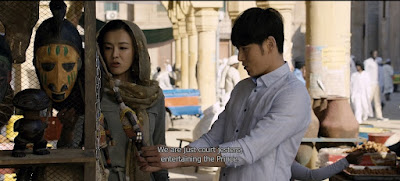This is a review of the 2017 Chinese action/comedy/propaganda film China Salesman. I don't know if you can find it online, I bought the stupid thing for this post (I need to work on my money management skills). There will be spoilers in this review.
It stars Dongxue Li as a salesman for a Chinese telecom company which is bidding for a contract to sell superior Chinese 3G telephone equipment to an African country. Opposing him is an Eeeeevil Western telephone company that's trying to win the bid so they can tank the country's phone network, thereby restarting a civil war so's they can sell arms to both sides. Diabolical Westerners, hiding their illicit arms trade behind a telephone company!
If battling phone companies seems like an odd premise, bear in mind that this was made around the time that Huawei's reputation was swirling down the drain, so much of the nonsense in this film is just touting the wonders of Chinese 3G technology compared to the junk the Westerners put out.
The producers of the film also planned an international release and so, to bolster its overseas box office, they cast two huge Hollywood action stars -- Steven Seagal and Mike Tyson. OK, maybe 'huge Hollywood action stars' is an exaggeration, although in Seagal's case, considering his ample girth, huge certainly fits.

|
|
Ms Ling and the China Salesman, who can't afford a radio phone to call their headquarters, whine about not being taken seriously |
We are introduced to the China Salesman and his assistant Ruan Ling as they are riding into the capital city on camels. Driving past in a fancy car are Susanna, the blonde woman who is running the bidding, and Michael, the salesman for the Eeeeevil Western phone/weapons dealing company. That seems like a bit of a conflict of interest to me, but what do I know? Susanna and Michael, from the comfort of their air-conditioned car, smirk at the two Chinese yahoos on their camels.
Later, while the Westerners settle into luxurious accommodations, the China Salesman and his sidekick open up their old regional office in the Capital. It is dusty and pretty run down looking. At one point the China Salesman even complains to Ling that they don't have a radio phone to call their headquarters in China. Wait, this movie is promoting the wonders of Chinese 3G telephony, and these two boobs can't even call their headquarters?
We then cut to a bar ran by Steven Seagal. It's kind of like Rick's bar in Casablanca, but instead of Humphrey Bogart you get Seagal waddling around. He's tasting some hootch from a barrel, declares it to be good and hands over crates of guns he's trading for the booze. Now, I'm not an international arms dealer, but it strikes me that Seagal got the short end of the stick trading of all those automatic weapons for only a few gallons of whiskey.
Then, who should happen to walk in but Mike Tyson. His backstory is that he is a fearsome African Chieftan. However, unfortunately for him his entire tribe was massacred and exterminated. His big ambition is to reconstitute his tribe. How he plans on doing that when they're all dead is a mystery - I guess he's just an optimist.

|
|
Tyson, Seagal, and Seagal's stunt double duke it out (image from Film Threat) |
Since there are two high alpha action stars in the same bar a fight is inevitable. One problem is Seagal is in his 'beached whale' phase so all he can do is sit and wave his arms around as he does some fearsome chair-fu. Meanwhile, Tyson wants nothing to do with that, he just wants to run around punching people. To solve the problem of providing a mobile Seagal for the fight they hired the world's skinniest stunt double to do the duty. The three of them bust up the place, crashing through walls and demolishing all props in sight.
When the required amount of promotional video has been filmed, the fight ends with a Tyson victory. Seagal, his contract completed, thankfully largely disappears from the show. Tyson continues as a minor character with an amusingly absurd faux-African accent that changes from scene to scene.
The movie's plot is pretty much of a mess. It stitches together over-the-top action sequences while pumping the superiority of Huawei telephones, whining about the lack of respect for China, blathering about the incomprehensible civil war, displaying supposed African culture, and revealing devious Westerners. My favorite Tyson appearance was at one of the innumerable, technobabble infused telephony negotiation sessions. Tyson crashes through the front door in an armored personnel carrier and touches off a massive gunfight. Way to negotiate Mike.
 |
| Who needs guns when you have a Chinese flag? |
Another ridiculous scene is when the China Salesman needs to get to the south to repair a vital telephone relay tower. However, there is only one mountain pass they can use to get there, and currently that pass is being blocked by the two warring rebel factions who are engaged in a massive firefight. Trying to solve this conundrum, the China Salesman thinks for a bit and then gets a brainstorm. He breaks out a gigantic Chinese flag, mounts it on the back of his truck and starts to drive through the pass. Hilariously the rebels all stop fighting and instead stand up and start shouting "Its China!", "China good!", "Yea for China!" so the China Salesman can make it through the pass. Yea, that sounds plausible.
Would I recommend you watch it? If you can get it for free the plot is preposterous, and it is stuffed full of ludicrously transparent propaganda. Still, it is a hoot and entertaining in a crappy B-movie sort of a way.
